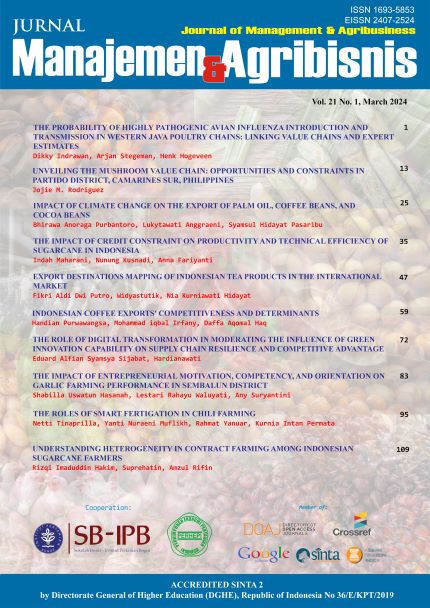Abstract
Palm oil has occupied an important position in the world trade of edible oils. India is still very dependent on palm oil imports, including other vegetable oils, to meet the needs of cooking oil and palm-based food industries. This study uses an ARDL approach to examine several factors that affect the demand for palm oil imports (CPO and RPO) from Indonesia in the Indian market. In the long run, CPO imports in the Indian market are significantly affected by CPO prices, sunflower oil prices, soybean oil prices, import tariffs, real exchange rates, real income per capita, soybean oil production in India, and India's population. Indonesian RPO imports in the Indian market are also significantly influenced by import price, soybean oil price, import tariff, and total vegetable oil production in India. Indonesia should be able to capitalize on the Indian market as its demand for vegetable oil is increasing. The increasing size of the Indian market (although more protective) is a challenge for Indonesia to meet the demand for vegetable oil in the Indian market. Indonesia's industrial and trade policy should shift the structure of India's import demand from CPO to palm oil-based downstream semi-finished and final products.
Keywords: import demand, crude palm oil, refined palm oil, Indonesia, Indian market
Authors
Authors who publish with this journal agree to the following terms:
- Authors retain copyright and grant the journal right of first publication with the work simultaneously licensed under a Creative Commons Attribution License that allows others to share the work with an acknowledgement of the work's authorship and initial publication in this journal.
- Authors are able to enter into separate, additional contractual arrangements for the non-exclusive distribution of the journal's published version of the work (e.g., post it to an institutional repository or publish it in a book), with an acknowledgement of its initial publication in this journal.
- Authors are permitted and encouraged to post their work online (e.g., in institutional repositories or on their website) prior to and during the submission process, as it can lead to productive exchanges, as well as earlier and greater citation of published work (See The Effect of Open Access).

